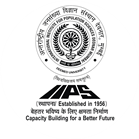- About IIPS
- Academics
- Study @ IIPS
- Departments
- Centres
- Controller of Examination
- Programme
- Distance and Online Education
- Training
- Facilities/Services
- Resources
- Virtual Learning
- Digital Initiatives (MHRD)
- Notice
- Seminars / Workshops / Conferences
- Conferences
- Publications
- Seminars
- Sponsored Research
- Workshops
- Collaboration
- National
- International
- NEP 2020
- Admission
- Courses
- Admission Bulletin
- TIME-TABLE For Admission 2025-26
- Model Question Papers
- Programme Coordinators
- Fellowships
- Academic Calendar
- International Students
- Visa Information
- Administration
- Faculty & Staff
- Research & Publications
- Library
- Information
- Right to Information
- Vigilance Officer
- Annual Report
- Director's Report
- Cells & Commitees
- Cells
- Commitees
- Committees of NEP 2020
- Staff Walfare Committee
- Cultural Committee
- Internal Committee
- Purchase Commitees
- Students Academic Committee
- Student Research Ethics Committee
- Anti-Ragging Committee
- Institutional Review Board
- Social Media Committee
- Prevention of Caste-based Discrimination Committee
- Code of Conduct and Professional Ethics
- National and International honours, Awards, Recognition, and Medals
- Online Facilities
- Employee's Corner
- Memorial Lectures
- Convocation
- IIPS Newsletters
- COVID 19 Information
- Life @ IIPS
Demographic Transition and Non-Communicable Disease Burden in India: Insights from Odisha Using NFHS Data
- Home
- Demographic Transition and Non-Communicable Disease Burden in India: Insights from Odisha Using NFHS Data
Abstract Content (not more than 300 word, should include: Introduction, Objective, Methodology, critical findings & Conclusion):
India’s demographic landscape is rapidly evolving due to declining fertility rates, increasing life expectancy, and urbanization. While these shifts indicate progress, they also contribute to the rising burden of non-communicable diseases (NCDs) like hypertension, diabetes, and obesity.
Objective: This study examines the impact of demographic transitions on NCD prevalence across Indian states, with a special focus on Odisha, using data from the National Family Health Survey (NFHS-5, 2019-21).
Methodology: The study analyzes NFHS-5 data to explore the relationship between demographic factors—fertility rates, urbanization, and aging—and NCD prevalence. Statistical comparisons across states highlight Odisha’s distinct health challenges.
Critical Findings: States with lower fertility rates and higher urbanization levels report more NCD cases. Odisha, with a total fertility rate (TFR) of 1.8 (below replacement level), records the highest NCD prevalence in India, affecting 272 per 1,000 people. The major contributing factors are:
Aging Population: Declining fertility and rising life expectancy result in a growing elderly population, increasing susceptibility to chronic diseases.
Urbanization & Lifestyle Changes: The shift from rural to urban living reduces physical activity, alters diets, and heightens stress, exacerbating NCD risks.
Environmental Factors: Worsening air quality and pollution further compound health vulnerabilities.
Conclusion: Odisha exemplifies the strong connection between demographic change and health risks. Addressing this growing burden requires targeted public health interventions, including promoting healthier lifestyles, enhancing healthcare systems, and mitigating environmental hazards. Understanding the demographic drivers of NCDs is essential for formulating policies that improve public health and ensure a healthier future for India.
Keywords: Demographic Transition, NCD, NFHS
Abstract theme:
In case of not been selected for oral presentation, do you want to be considered for the poster presentation ?:
Yes
Do you require financial support to attend the seminar ? (Not applicable for virtual meet):
Yes-full
Gender:
Male
Evaluation Status:
No
